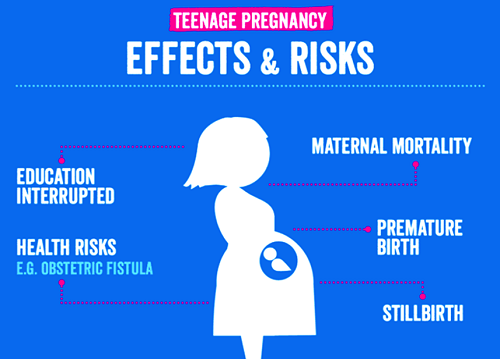Ghana News | Ghana Politics | Breaking News in Ghana

Teenage pregnancies stealing future of adolescent girls
“My 14-year-old daughter has been impregnated and I feel so shuttered because I could have avoided my daughter’s current ordeal,” Mary (not real name) told the Daily Graphic in a very sorrowful voice.
“On hindsight, I would have ignored all my anxieties about contraception and introduced her to it because of the sexual abuse I experienced at age 18 that got me pregnant and shattered my dream of becoming an accountant.
Advertisement
A single mother of two, a boy and girl, Mary, although not financially sound, has been doing her best for them, until a neighbour offered to train the girl, who was 12 at the time in school, because he claimed he had noticed how brilliant she was.
“I accepted because he was a well-respected and a neighbour my children would often go to, once a while because he stayed not too far away from us to greet him. Unfortunately, he was abusing my daughter sexually and threatened her not to mention it to anyone.
“When my daughter took ill, she feared what exactly was happening to her and so, told me all she had been going through. I took her to hospital and I was informed that she had been impregnated,” she told the Daily Graphic.
Mary’s worry was that although her daughter’s school said it would allow her to attend school with the pregnancy, her health was making it impossible to do that and feared that her daughter might not be able to become the doctor she envisaged to be.
“I am currently considering an abortion but I am afraid that it could go wrong and I don’t want to lose my daughter,” she said, adding that the perpetrator was currently on the run as the police were after him.
National situation
Statistics available at the Ghana Health Service (GHS) shows that many adolescent girls go through similar ordeals of teenage pregnancies which either causes them to drop out of school or are forced into the illegality of child marriage.
The GHS statistics indicate that 100,000 girls are impregnated each year from 2016 to 2020. The data further indicates that adolescent birth rate is 75 per 1,000 live births nationally.
It explained that the figure could be higher than captured by the 2017/18 Multiple Cluster Survey (MICS6) because not all pregnant adolescent girls accessed antenatal services or were delivered in hospitals for various reasons.
The United Nations Children’s Emergency Fund (UNICEF) and other stakeholders have bemoaned the trend and are calling for collaboration among stakeholders to ensure an enabling environment for all young people, especially girls, to be safe and have equal opportunities to maximise their potential.
A Child Protection Officer and Consultant at UNICEF, Mrs Joyce Odame, said adolescents, defined by the United Nations to be between the ages of 10 and 19 and adopted by the government in its recent adolescent’s health service policy and strategy for 2016 to 2019, were faced with a number of issues requiring more attention and support.
Risks
She said girls were more vulnerable to abuses such as rape, defilement, child marriages, female genital mutilations, among others.
Ms Odame said the teenage pregnancy figures looked like just numbers, but actually represented promising adolescent girls who might miss the opportunity to maximise their potential because their education would be truncated by virtue of being impregnated.
The MICS6 indicates that risk of dying from a complication of pregnancy and childbirth is higher among adolescent girls than among young women aged 20 to 24, but lower for women after age 30 when the risk starts to increase steeply with age.
“Ghana has a very young population. According to the population projections done by the Ghana Statistical Service for 2020, nearly half of the population is below the age of 20, with 22 per cent being adolescents, “ she said.
That, she said, presented a great opportunity for the country, but was quick to add that harnessing demographic dividends would depend on the kind of investments made into the youth.
Mrs Odame indicated, however, that having a young population was also challenging due to the issues that they were confronted with.
Stakeholders are of the view that because issues affecting adolescents are multifaceted, particularly, adolescent girls, an integrated cross-sectorial approach aimed at child protection, education, health and social protection will be required to deal with the situation effectively.
Adolescent reproductive health
On adolescent reproductive health, Mrs Odame said young people tend to take risks and/or adopt risky sexual behaviours, including unprotected sex that exposed them to unwanted pregnancy, unsafe abortion, sexually transmitted infections (STIs), including HIV, and other risks to their health and well-being.
The United Nations advocates that in order for people to be able to plan their lives and families, every sexually active person, young or old should have access to modern contraceptives.
The National Population Council also holds the view that one teenage pregnancy is too many and so stakeholders could not continue to assume or pretend not to be aware of the fact that most adolescents are sexually active regardless of stakeholders preaching of abstinence.
It said although abstinence was the best way, most adolescents were unable to adhere and coupled with the risk of sexual abuse, it was critical to present to them the option of contraception.
Mrs Odame said adolescent girls were more likely to be sexually active or suffer from sexual abuse than their male counterparts, making them more vulnerable.
UNICEF also advocates the strengthening of adolescent sexual reproductive health education to empower those young ones to make informed decisions.
Mrs Odame said UNICEF worked with partners in Ghana to ensure that children in the second decade of life were empowered.
“Adolescence is a crucial period when children have more responsibilities, attempt new ways of doing things and seek independence. It is a period when values and skills, which impact the rest of their lives, are developed.
“Keeping this in mind, UNICEF is working to support their education, emotional and physical well-being, and free thought so that they can engage positively with their environments,” she said.
UNICEF's focus on adolescents and young people in Ghana is gaining momentum with increased emphasis on equipping them with educational opportunities and skill training.
Writer’s email: [email protected]




